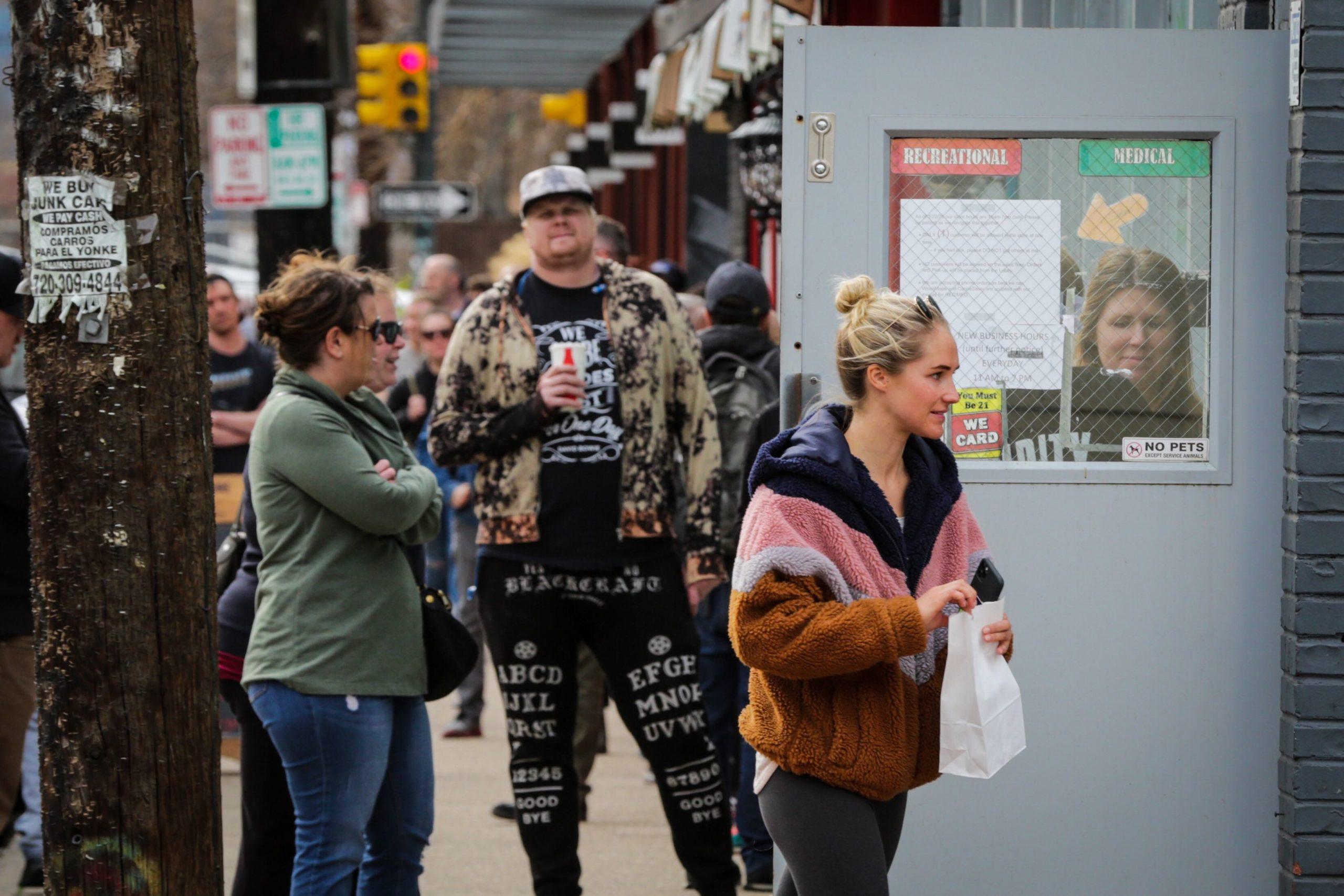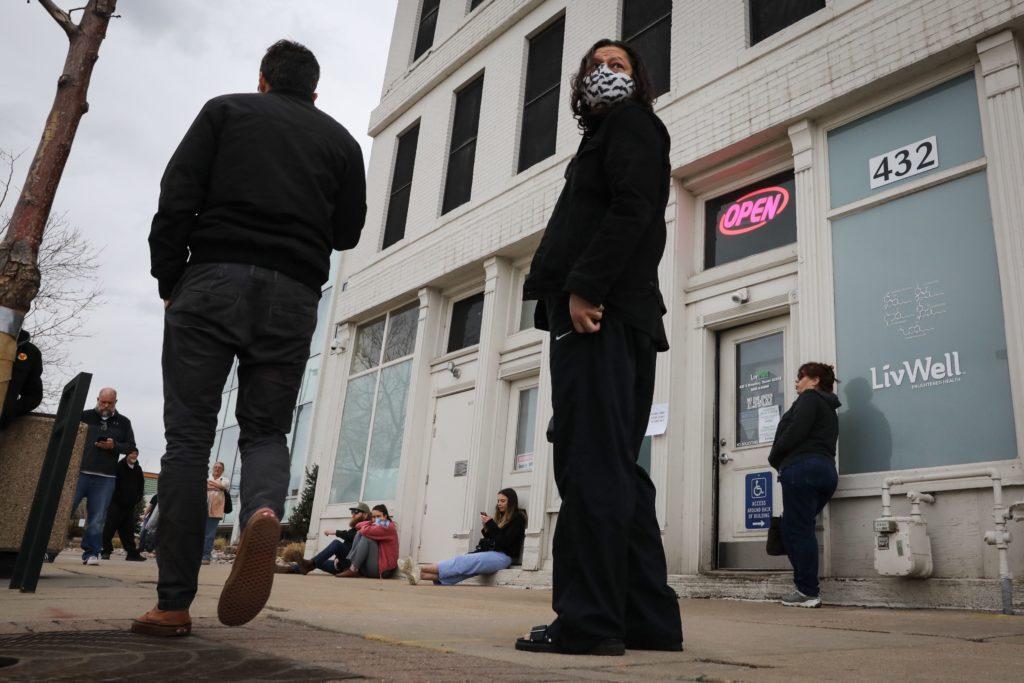
In about two hours, Denver Mayor Michael Hancock taught public officials a valuable lesson about the meaning of the word “essential.”
When he announced the city’s stay-at-home order on March 23, Hancock said recreational marijuana dispensaries, as well as liquor stores, would not rise to the level of “essential.” The Denver residents who quickly formed long lines at liquor stores and pot shops disagreed.
That’s where the trouble began for Tim Cullen, CEO of Colorado Harvest Company.
The announcement “created chaos on that afternoon,” he said. Throngs of people rushed stores, contradicting Hancock’s earlier advice not to “panic buy.” The mayor’s office issued new guidance just a few hours later and told Denverites to get out of line and go home.
The new guidelines included recreational pot businesses, a lifeline for people like Cullen. The weeks since have presented challenge after challenge. He’s had to let some employees go but he’s never had to close his doors for a single day.
“It’s been a blessing to be deemed essential in terms of being able to hold on to my staff and keep these stores up and running, and maintain payroll and be able to pay our vendors and make our lease payments,” Cullen said. “And I know that there’s a lot of retailers out there not able to do any of those things. And so being essential has been the difference between us being in business and not being in business.”
During normal times, the cannabis industry faces many challenges that other businesses do not, largely due to the fact that marijuana is still illegal on the federal level. Business owners like Cullen are cut off from most — if not all — conventional banking.
“I don’t even think the public is even aware of that issue any longer, it’s just faded into the dark,” he said. “But we still cannot take people’s debit cards and credit cards. It’s still all done in cash, which is insane.”
Recent emergency rules allow for Colorado pot businesses to accept payment online. But that’s if a business can find a bank that will agree to process those payments. Historically, that’s been a challenge for the industry and it’s why many pot shops are still cash-only businesses.
On top of that, there are newer challenges.
The $2.2 trillion stimulus passed by Congress in March included a life raft for small businesses to continue to pay their employees. That is, unless, that business deals in cannabis.
America’s legal marijuana industry provided nearly 244,000 full-time jobs at the beginning of 2020, according to the cannabis site Leafly. Colorado ranks second in the nation when it comes to cannabis employment and accounts for about 35,000 of those jobs.
And it’s not like consumers have suddenly stopped wanting their legal weed.
“In general, there hasn’t been a significant decrease in demand since all of this craziness started,” says Andrew Freedman, who runs the California-based firm Cannabis Public Policy Consulting.
In early March, when stay-at-home orders began to cascade across western states, California, Washington and Colorado all saw big spikes in cannabis sales.
In the weeks since only Colorado has seen a sales dropoff.
“I mean this has always been a theory about legal weed, which is that it would behave like alcohol and that during bad times, people search these kinds of distractions out,” Freedman says. “And again, it's going to take a while to confirm, but it has been behaving that way so far.”

That more or less consistent demand is what leads industry watchers to call legal weed “recession-proof,” but cannabis isn’t alcohol.
Tim Cullen’s situation at Colorado Harvest Company is proof that the demand doesn’t matter as much when access is an issue. Other western states allow for marijuana delivery. By contrast, Colorado will not have widespread marijuana delivery until at least 2021. Cullen thinks that’s what people would prefer right now.
“I think we would probably see that 40-50 percent online ordering go to 40-50 percent delivery,” he said, referring to the portion of his customers who order online for pick-up. “So I think delivery will play a big role in the future, just like it does for groceries and such.”
Another challenge for the cannabis industry is the supply chain — or rather chains. Colorado, like every other legal state, is experiencing what Freedman calls a “stress test.” Federal law prohibits cannabis from crossing state lines.
“Like for alcohol, for instance, you just have to keep one or two plants up and running and running at full capacity, and they can supply the entire 50 states,” Freedman said. “Here, every different state has to maintain its own supply chain.”
All the while, scaling back the workforce, and at times physically reconfiguring the workplace to allow for social distancing. This makes every link in the chain more vulnerable, and Cullen said it costs money.
“So we catch it on all sides, and then to say, well, you’re essential and allowed to be open, but we won’t help you with any aspects or any type of federal funding with your business whatsoever,” he said. “It’s just sort of a punch in the stomach.”
And the industry may not be the only one to feel the blow. Security firms, cleaning services, accountants, law firms — they, too, could also be excluded from federal aid to small businesses on the basis of working with marijuana businesses.
Josh Kappel, a partner at the Denver-based cannabis law firm Vicente Sederberg, said the guidelines for the relief program can be read to include those types of businesses, which has created confusion among his clients. “And what’s difficult,” he said, “is the confusion doesn’t help, especially when the clock’s ticking, you know?”
Any business that applies for aid has to certify to the Small Business Administration that they’re not breaking any federal laws, Kappel said. The risk is being slapped with a charge of falsifying federal forms.
Oregon Rep. Earl Blumenauer, founder and co-chair of the Congressional Cannabis Caucus, and Colorado's Rep. Ed Perlmutter have introduced legislation to handle the SBA COVID-19 relief problem. Their proposal would make state-legal marijuana businesses eligible for the Paycheck Protection Program and other disaster loan programs through the Small Business Administration.
There’s also increasing pressure at the federal level to include the cannabis industry in any future stimulus bill, both from lawmakers and lobbyists. Even Colorado Gov. Jared Polis has advocated for it. National industry groups have also called on state governments to extend relief to cannabis businesses.
Tim Cullen, from Colorado Harvest Company, is hopeful that help is on the way.
“The cannabis businesses in Colorado and around the country provide jobs,” he said. “They provide insurance, they provide a living and take up retail space and pay taxes and all the things that every other business in this country does. And if anything positive can come out of COVID, I think marijuana legalization would be a fantastic one.”
More than 30 members of congress have pledged to include the cannabis industry in the next stimulus bill, including House Speaker Nancy Pelosi. And, Cullen said he also has something else to look forward to.
“This week these checks started to come out,” he said, referring to the $1,200 stimulus checks issued to most Americans. “I realized people are going to spend their money on cannabis, and whether the federal government likes it or not, people are going to give me some of their federal money and we’re going to take it because we need it.”
Otherwise, another stimulus bill might be all business owners can hold out for.








